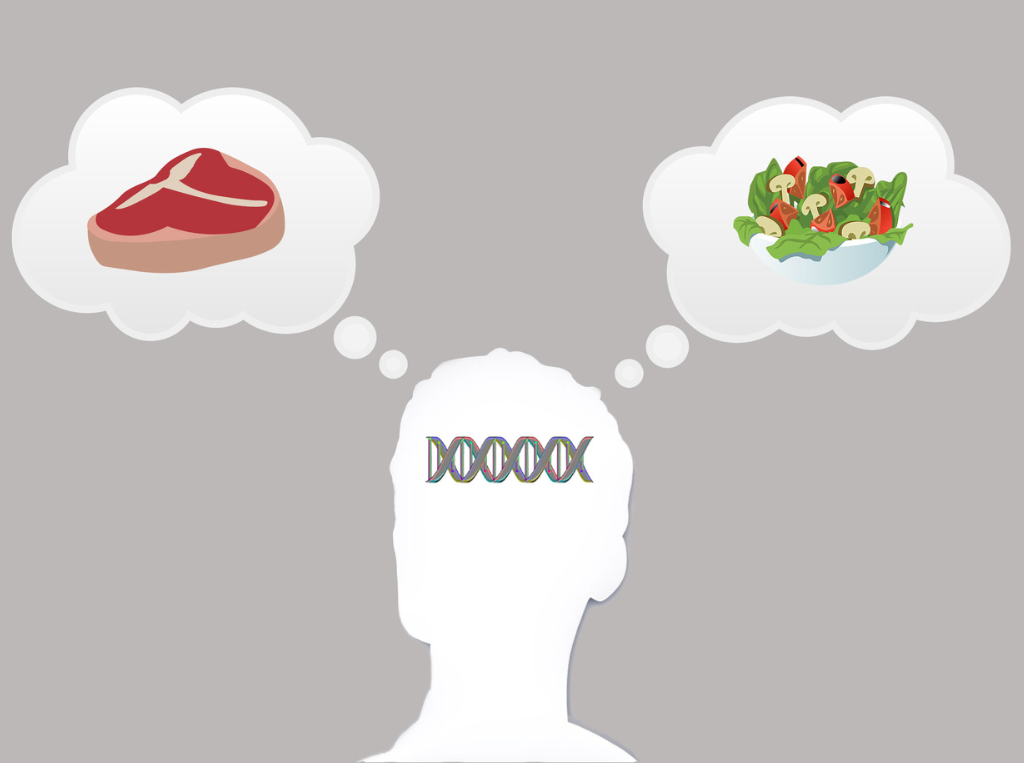Are You Vegetarian? It Might Be in Your DNA, According to A New Study
5 Mins Read
A new study has found that being vegetarian may be linked to three genes and that the fact that some people find it challenging to stick to a meatless diet could be explained by genetics. While this is a correlation (and not causation), researchers say the findings could help produce better meat alternatives.
Using data from the medical database UK Biobank, the research analysed the genomes of 5,324 ‘strict vegetarians’ – those who hadn’t eaten meat or seafood in the last year – and compared them to 329,455 non-vegetarians. The researchers found a link between one genetic location (or SNP), rs72884519, and people who are vegetarian.
Meanwhile, the study identified 34 genes that could be linked to vegetarianism. Three of these are significantly linked, and two are associated with markers of brain function and lipid metabolism (during which fats are broken down into energy). The researchers say this raises the possibility that “differences in lipid metabolism and their effects on the brain may underlie the ability to subsist on a vegetarian diet”.
The other 31 genes are more weakly related to vegetarian diets, with several linked to lipid metabolism as well. “We are hypothesising that maybe one’s ability to adhere to a vegetarian diet may have something to do with how they deal with fats in their body and how that affects brain function,” study lead Nabeel Yaseen, a professor emeritus of pathology at Northwestern University, told NBC News.

Why people may genetically find it hard to give up meat
The peer-reviewed study, published in the Plos One journal, was based on two questionnaires participants filled out for UK Biobank. The researchers first asked people to report whether they had eaten meat within the last year, and was carried out four times between 2006 and 2019. The second, conducted five times between 2009 and 2012, asked respondents to log everything they had eaten in the past 24 hours.
It’s not the first time genetics have been linked to a person’s preference for certain foods – last year, similar research found this correlation. A dislike for some specific foods (like coriander) has also been associated with hereditary traits.
“With meat, there’s something similar,” Yaseen said in a statement. “Perhaps you have a certain component – I’m speculating a lipid component – that makes you need it and crave it.”
The researchers point out that the number of vegetarians in many countries is low – a recent Gallup poll showed the share of Americans on a meatless diet decreased from 5% in 2018 to 4% this year, while this figure is 4.5% in the UK. “It seems there are more people who would like to be vegetarian than actually are, and we think it’s because there is something hard-wired here that people may be missing,” explained Yaseen.
“One area in which plant products differ from meat is complex lipids,” he added. “My speculation is there may be lipid component(s) present in meat that some people need. And maybe people whose genetics favour vegetarianism are able to synthesise these components endogenously. However, at this time, this is mere speculation and much more work needs to be done to understand the physiology of vegetarianism.”
For many people, vegetarianism is linked to moral and religious beliefs. “While religious and moral considerations certainly play a major role in the motivation to adopt a vegetarian diet, our data suggest that the ability to adhere to such a diet is constrained by genetics,” Yaseen said.

Limitations and implications for alt-meat
Yaseen did outline a couple of key limitations of the study. Firstly, the research only included white Caucasians, excluding other ethnicities to avoid incorrectly linking genes associated with a particular race to vegetarianism. So the study would need to be repeated with different ethnicities to find out whether these findings apply to a broader demographic. Secondly, the research only covered a tiny fraction of the human genome, revealing that it’s possible that more genes could be related to vegetarian diets.
Additionally, Joanna Cole, an assistant professor of biomedical informatics at the University of Colorado’s School of Medicine (who was not involved in the study), cautioned that the results of the study can only find correlation – not causation – between genetics and a vegetarian diet.
“There could be genes in this region that are involved in your trait, but that doesn’t mean they cause your trait,” she told the Washington Post. A gene found in the Plos One study might be linked to another trait itself associated with vegetarianism, for example. “There’s a lot of follow-up that should be done to actually understand how it’s working.”
She added that research has found that genetics may be responsible for up to 10% of a person’s preference for a given food. And in January, a study compared twins to examine the role of genetics in dietary preferences, and found that genetics can account for “70 to 80% of individual differences in abstinence from eating beef, pork, poultry, fish and shellfish”, as the lead author Laura Wesseldijk told NBC News.
Wesseldijk, a behavioural geneticist at Amsterdam University Medical Centers (not involved in the new study either), added that human traits are never determined by nature or nurture alone, and are instead “completely entangled”. People’s upbringing and surroundings – which can be influenced by religious and moral factors, health concerns or culture – play a major role too. “An environment can completely counteract something that is highly heritable, and the same goes with vegetarianism,” she said.
Yaseen outlined a hope for further research to find out what foods are genetically suitable for people and make customised dietary plans, adding that it could pave the way for better plant-based meat (which could subsequently help reduce meat consumption): “We hope that future studies will lead to a better understanding of the physiologic differences between vegetarians and non-vegetarians, thus enabling us to provide personalised dietary recommendations and to produce better meat substitutes.”




